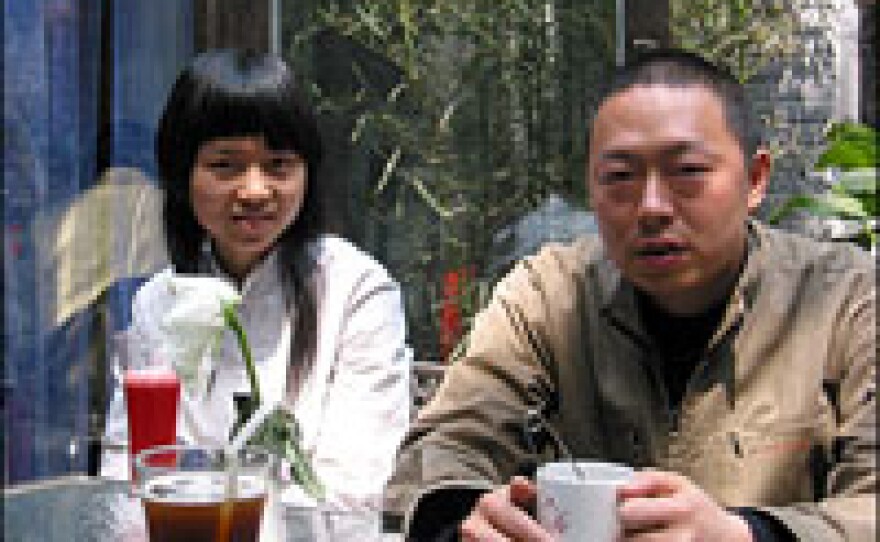
In China, the story of a young police officer who published a journal of poetry, fiction and reviews has captivated domestic media and their audiences. He was fired last month after criticizing police practices in his writing, although police said the reason was that he was putting out an unlicensed publication.
But the officer, Wu Youming, decided he was out of place in the state system, anyway.
Wu doesn't look like a cop anymore. He fits in perfectly among the painters, writers and musicians while visiting the galleries of Beijing's 798 arts district, a cluster of converted factories. The young artists display works of political sarcasm, like a sculpture of Chairman Mao, the leader of China's communist revolution, wearing a floral-print dress.
Wu says he finds these works amusing, but they're not his style.
"My writings are more a testimony of the police's gradual progress from the chaos of the 1990s toward the rule of law," Wu says in Chinese. "They're about a person caught up in our rapidly changing society. They're not about subverting anything."
Wu recalls joining the force in 1994 as a beat cop in Huangshi, a city on the Yangtze River in central China's Hubei province. Wu was 20 years old and proud to be enforcing the law. He was quiet and didn't hang out much with his colleagues.
In 1996, Wu was reassigned to a different precinct. Part of his job involved nabbing prostitutes and gamblers, mostly just to fine them. His assigned quota was to bring in the equivalent of nearly $600 in fines a month.
In 1999, Wu was transferred to the traffic police. During that period, he read a lot of translated works, including Mahatma Gandhi's autobiography. The following year, he began editing and publishing his artistic journal, "Water Bubbles."
"After coming into contact with these writings, I began to think about things in a different way, not necessarily the way police think about them," Wu says. "The police require you to be a silent screw in the machine. You must keep quiet and unconditionally execute your leaders' orders."
Wu eventually stopped meeting his fining quotas. He published an Internet essay, pointing out that the quotas are illegal. He also wrote a letter to China's parliament about how police illegally blocked petitioners who traveled to Beijing to protest injustice. He was fired days later. Police in Huangshi declined to comment on Wu's dismissal.
Wu's wife and artistic collaborator, Zhou Li, said the firing came as a shock.
"Since he was fired, we've been free in a spiritual sense. We can do whatever we want now," she says in Chinese. "It's true that things are harder for us financially, but it's not a big deal for us, because our material requirements are very few."
Wu has taken some comfort in the many supportive e-mails he's received, some offering him jobs or money. But he insists that he's not the dissident hero his supporters think he is. He says his former profession is widely misunderstood.
"Ordinary people may think that the police are just a bunch of thugs and hoodlums," Wu says. "Actually, it's not like that. Most police do a lot of work. But the people don't accept them because police leaders have cut off channels of communication with the people."
Part of the problem, he says, is that cops are so busy enforcing unrelated government polices that they have little time to fight crime.
In the end, Wu says, the system expelled him not because his criticisms were off the mark, but because he failed to obey its code of silence. He thinks his former employers could have punished him a lot more harshly. He considers the fact that they didn't a sign of the authorities' increasing tolerance.
Copyright 2022 NPR. To see more, visit https://www.npr.org. 9(MDAzMjM2NDYzMDEyMzc1Njk5NjAxNzY3OQ001))






